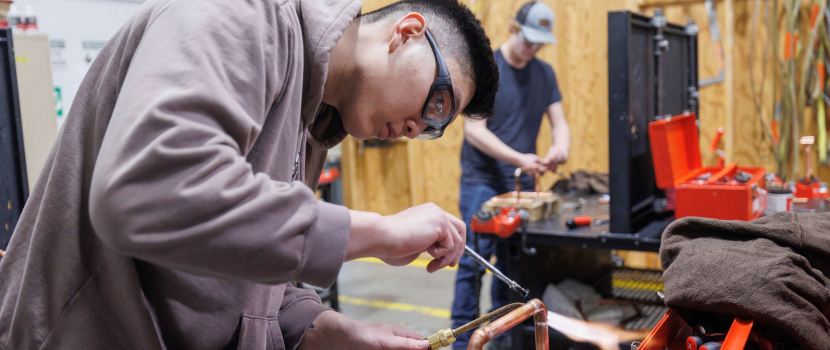
Start date
January 13 - May 2, 2025
August 2025
Length
16 weeks
Location(s)
Regina, SaskatoonFast track your career in the skilled trades with Sask Polytech's 16-week applied certificate program. Plumbers install, replace and maintain water and sewage systems in residential, commercial and industrial buildings. Many are also licensed gas fitters.
The Plumbing and Pipefitting program provides the knowledge and skills you need for an entry level job. Your learning is practical and hands-on – and includes a two-week job placement that lets you test your skills in the real world.
Plumbing is a skilled trade. The more education and experience you get, the higher you can climb on the wage-earning ladder. A fourth-year journeyperson plumber can earn double the hourly wage of a first-year plumbing apprentice.
The Plumbing and Pipefitting applied certificate program is delivered at Sask Polytech campuses in Regina and Saskatoon. It is also available off campus through the Centre for Continuing Education and regional colleges.
For more information, email ConEd@saskpolytech.ca or call 306-659-4418.
Apprenticeship credit
Trade to degree
Career and salary information
Your career
Successful completion of the Plumbing and Pipefitting applied certificate can open the door to entry level jobs with plumbing contractors and construction companies, as well as with maintenance departments in power, mining or manufacturing companies.
Potential careers
| Sample job title | NOC classification |
|---|---|
| Plumber | Plumbers (72300) |
| Gas fitter | Gas fitters (72302) |
| Pipefitter | Steamfitters, pipefitters & sprinkler system installers (72301) |
| HVAC mechanic | Heating, refrigeration & air conditioning mechanics (72402) |
Admissions
Admission requirements
- Grade 11
- English Language Requirement
Alternative admission
Applicants who do not possess the academic qualifications for a program may be admitted if evidence of probable success can be established through an alternative admission assessment. Applicants are automatically considered for alternative admission. However, some specific admission requirements may still need to be met.
ACCUPLACER©
Refer to the ACCUPLACER© cut scores for this program below, and review additional details concerning Alternative Admission using Accuplacer.
- 250 Arithmetic
- 245 Quantitative Reasoning, Algebra, and Statistics
- 247 Reading
Post-secondary
Some programs allow applicants to meet the admission grade level requirement using 15 approved post-secondary credits. Review additional information.
Admission method
First Qualified/First Admitted
The First Qualified/First Admitted (FQFA) process is used for the majority of Saskatchewan Polytechnic programs. When we determine that you meet the program's admission requirements, you will be offered admission based on the date you fully qualify for the program. The earlier you provide the appropriate documents and information that qualify you for admission to the next intake, the earlier you might begin your studies.
Applications for all FQFA programs open September 1 each year.
Sponsored programs or programs targeted to specific groups do not accept applications year round or maintain an application pool.
See Admission Processes for more information about this method of admission.
Tuition and fees
Estimates are based on current rates and are subject to change. Amounts for a program may vary by campus. Totals shown here include all mandatory fees as well as approximate cost for books and supplies. Visit the Tuition and Fees web page for a complete breakdown of tuition and fees for this program.
2025-26 academic year
$17,750
Additional costs to be considered for personal protective equipment. Steel toed work boots are required.
You may be eligible for a student loan for a portion of your fee. Individuals on employment insurance (EI), who wish to continue receiving benefits while attending training should contact their local Labour Market Service office for further information.
Courses
Get credit for what you know
Prior Learning Assessment and Recognition
Saskatchewan Polytechnic recognizes that adults learn in many different ways. This includes acquiring knowledge and skills through life and work experience or non-formal training.
See link(s) below to get more information about PLAR.
Transfer credit
Many Sask Polytech students benefit from transferring course credit. You may be eligible to transfer credit to Sask Polytech or to another college or university.

